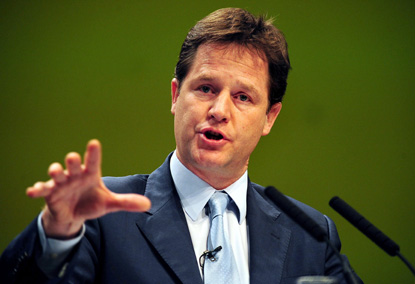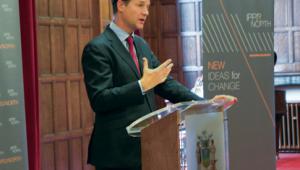By Richard Johnstone | 5 September 2011
Deputy Prime Minister Nick Clegg has said that none of the new free schools being set up across England will be profit-making.

The first of the schools, which can be set up by charities, parents or teachers outside local authority control, are opening this week. Clegg, speaking at Southfields Community College in Wandsworth, south London, admitted that the policy was controversial and had ‘risks’.
However, he insisted that these had been mitigated to create ‘a policy which will promote higher standards, better integration, and fairer chances, especially for children from the most deprived backgrounds’.
The Liberal Democrat leader said that the UK has ‘one of the most unequal school systems in the world’, with the gap between poorer and wealthier children GCSE remaining constant. The introduction of more choice into the education system through the new schools would encourage ‘under-performing schools to raise their game’.
Around 24 schools are set to open today at the start of the school year, and Clegg said: ‘Let me be clear what I want to see from free schools. I want them to be available to the whole community – open to all children and not just the privileged few. I want them to be part of a school system that releases opportunity, rather than entrenching it.’
However, he added: ‘To anyone who is worried that, by expanding the mix of providers in our education system, we are inching towards inserting the profit motive into our school system, let me reassure you. Yes to greater diversity, yes to more choice for parents. But no to running schools for profit, not in our state-funded education sector.’
Free schools would be acceptable only if they promote social mobility, he said, adding that he was pleased that half of the first wave were in deprived areas.
Education Secretary Michael Gove will be making decisions on the second round over the coming weeks, and Clegg said he wanted ‘all of them’ to be in poorer neighbourhoods.
He added that the ‘pupil premium’ – the £2.5bn additional education funding for pupils entitled to free school meals – would help to ensure that free schools and academies, which are also free of local authority control, select disadvantaged pupils. Although the government won’t prescribe how schools spend the money, Clegg called on them to ‘look carefully at the research that already exists’ for raising educational attainment and prioritise smaller class sizes, more one-to-one support and after-school clubs for older pupils.
He also announced a pilot giving local authorities that are no longer running schools a new role in deciding who new providers are and holding existing providers more sharply to account.
‘Local authorities, closer by their very nature to their community than the secretary of state, could be more determined than distant Whitehall to drive up attainment in their own patch – for example, by setting higher standards for all schools in their area.
‘That is why I am inviting those local authorities which wish to move to the new phase to grasp this opportunity and be involved in piloting this new role, starting from next year.’
Responding to the speech, the deputy general secretary of the Association of Teachers and Lecturers, Martin Johnson, said that Clegg had highlighted the huge conflicts within the government. ‘He says that local authorities could hold academies and free schools more sharply to account, but Conservative ministers say that school autonomy is fundamental to the academy programme. It is not possible to have both.’





















